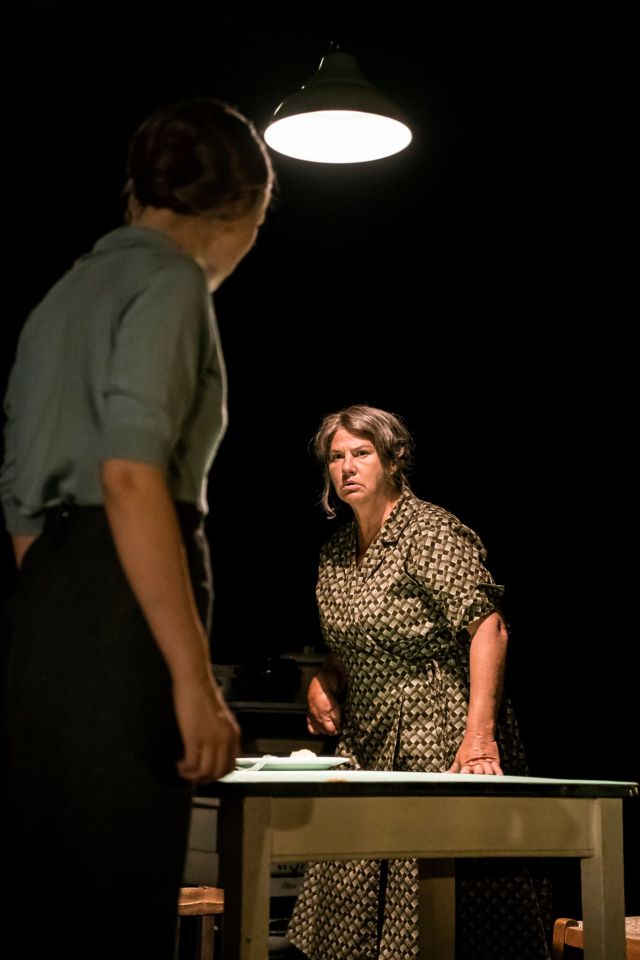The American playwright/journalist Sophie Treadwell's 1928 expressionist drama crops up every so often in order to allow a director to leave his or her signature upon it, so the first thing to be said about Natalie Abrahami's Almeida Theatre revival of Machinal is that it puts the play and not the production first.
Whether that is entirely beneficial is open for debate, given the jagged, staccato nature of writing that amounts to a sequence of extended snapshots from an Everywoman's descent into a gathering darkness that by play's end has all but swallowed her whole. Viewed up close, as it were, and without the scenic overlay (overkill in some cases) I've seen applied to it in the past, Machinal here emerges as tersely fascinating, without prompting much by way of an emotive response one way or the other to the propulsive narrative on view. At the same time, you can understand the appeal of the piece to Abrahami, who locates in its distinctive timbre a harbinger of sorts of Beckett, who chronicled a not dissimilar dislocation of the mind but with an entirely separate linguistic power.
 The irony of this play in performance is that its portrait of dehumanisation can itself be subsumed within a scenic spectacle that all but obliterates the people contained therein: that was pretty much the effect of its National Theatre rendition in 1993, spectacular (and then some) though Ian MacNeil's design was. A happier balance was struck in New York a few years ago by Lyndsey Turner, thanks in no small measure to the emotional transparency brought to the part of the doomed Helen Jones by Rebecca Hall, in her Broadway debut.
The irony of this play in performance is that its portrait of dehumanisation can itself be subsumed within a scenic spectacle that all but obliterates the people contained therein: that was pretty much the effect of its National Theatre rendition in 1993, spectacular (and then some) though Ian MacNeil's design was. A happier balance was struck in New York a few years ago by Lyndsey Turner, thanks in no small measure to the emotional transparency brought to the part of the doomed Helen Jones by Rebecca Hall, in her Broadway debut.
Inheriting the play's defining if slippery lead role – is Helen a character or simply a construct? – Emily Berrington conveys a restlessness that can find no respite amidst her belligerently impersonal environs. First seen as a strap-hanging teenager on the New York subway en route to the impersonal clatter of the workplace, "Miss A" (as this young stenographer is called) is then found locked in fractious combat with her mum (Denise Black, pictured with Berrington above). From there, she marries her decidedly awkward boss and has a daughter, only soon after to take a lover (Clark Gable, of all people, originated that role back in the day). Murder and a trial ensue – Treadwell was inspired by a 1927 court case of the day – during which "this purgatory of noise", as the play describes the clamour of existence, deafens our heroine at every turn. (Even in hospital she is faced with aurally toxic building works.) Silence, when it arrives, comes at a grievous cost, and sound designers Ben and Max Ringham make every ambient intrusion count.
Specificity of time is deliberately and counterintuitively elastic (Helen's five-year-old daughter is au fait with technology), a decision that makes one wonder why Abrahami didn't go the whole hog: heaven knows, depersonalisation has its place today, though I'm not sure our fast-typing heroine need also endure the travails of RSI. The material as scripted seems tethered to both time and place, notwithstanding a gay pick-up scene better attuned to Tennessee Williams, whom the Almeida resurrected in style of late with Summer and Smoke.
Berrington compels attention without ever making you bleed for her: a difficult task in any case given that the clinician in Treadwell the journalist can't quite square the circle with her humanist impulses as a playwright. The protean Miriam Buether's mirrored sets offer a cunning dual perspective on proceedings, while Jack Knowles's lights blind the audience into submission as each new episode snaps into view. The American accents, I should add, are overemphatic to a fault but relax somewhat as the evening continues. Let's just say that if the Almeida ever decides to adapt Goodfellas for the stage, these actors are good to go.















Add comment